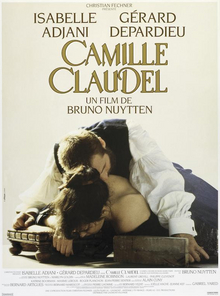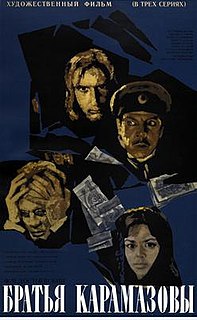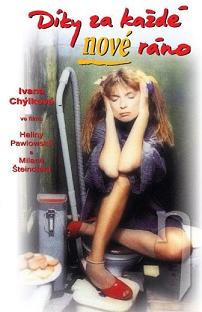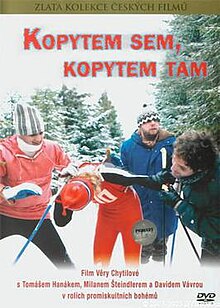
Camille Claudel is a 1988 French biographical drama film about the life of 19th-century sculptor Camille Claudel. The film was based on the book by Reine-Marie Paris, granddaughter of Camille's brother, the poet and diplomat Paul Claudel. It was directed by Bruno Nuytten, co-produced by Isabelle Adjani, and starred her and Gérard Depardieu. The film had a total of 2,717,136 admissions in France. Adjani was nominated for the Academy Award for Best Actress for her role, the second in her career.
The Women on the Roof is a 1989 Swedish film written and directed by Carl-Gustav Nykvist. It stars Amanda Ooms and Helena Bergström. It was entered into the 1989 Cannes Film Festival. At the 25th Guldbagge Awards, Stellan Skarsgård won the award for Best Actor. The film was selected as the Swedish entry for the Best Foreign Language Film at the 62nd Academy Awards, but was not accepted as a nominee.

Alsino and the Condor is a 1982 Nicaraguan film directed by Chilean filmmaker Miguel Littín. It was nominated for the Academy Award for Best Foreign Language Film. It won the Golden Prize at the 13th Moscow International Film Festival. The film was a co-production between Nicaragua, Mexico and Cuba. The film is loosely based on the novel Alsino by Chilean writer Pedro Prado, and is set during the Nicaraguan Revolution.

The Brothers Karamazov is a 1969 Soviet film directed by Kirill Lavrov, Ivan Pyryev and Mikhail Ulyanov. It is based on the 1880 novel by the famous Russian author Fyodor Dostoevsky. It was nominated for the Academy Award for Best Foreign Language Film. It was also entered into the 6th Moscow International Film Festival, winning Pyryev a Special Prize.

Thanks for Every New Morning is a 1994 Czech film directed by Milan Šteindler. It was the Czech Republic's submission to the 68th Academy Awards for the Academy Award for Best Foreign Language Film, but was not accepted as a nominee.

A Successful Man is a 1986 Cuban drama film directed by Humberto Solás. It was screened in the Un Certain Regard section at the 1987 Cannes Film Festival and it was entered into the 15th Moscow International Film Festival. It won Best Production Design and Grand Coral - First Prize in the 1986 Havana Film Festival. The film was selected as the Cuban entry for the Best Foreign Language Film at the 60th Academy Awards, but was not accepted as a nominee.
Kozara is a 1962 Yugoslav film directed by Veljko Bulajić. It is a well known film of the partisan film subgenre popular in Yugoslavia in the 1960s and 1970s and depicts events surrounding the Battle of Kozara.
Forbidden Dreams is a 1986 Czech drama film directed by Karel Kachyňa. It was entered into the 15th Moscow International Film Festival. The film was selected as the Czechoslovak entry for the Best Foreign Language Film at the 60th Academy Awards, but was not accepted as a nominee.

Life Is Most Important is a 1987 Mexican drama film directed by Luis Alcoriza. It was entered into the 15th Moscow International Film Festival. The film was selected as the Mexican entry for the Best Foreign Language Film at the 60th Academy Awards, but did not garner a nomination.
Palaver is a 1969 Belgian fantasy film directed by Emile Degelin. The film was entered into the 6th Moscow International Film Festival. The film was selected as the Belgian entry for the Best Foreign Language Film at the 42nd Academy Awards, but was not accepted as a nominee.
Twenty Hours is a 1965 Hungarian drama film directed by Zoltán Fábri. The film was selected as the Hungarian entry for the Best Foreign Language Film at the 38th Academy Awards, but was not accepted as a nominee. The film shared the Grand Prix with War and Peace and won the Prix FIPRESCI at the 4th Moscow International Film Festival.

A Woman for a Season is a 1969 Romanian comedy film directed by Gheorghe Vitanidis. It was entered into the 6th Moscow International Film Festival where Irina Petrescu won the award for Best Actress. The film was selected as the Romanian entry for the Best Foreign Language Film at the 42nd Academy Awards, but was not accepted as a nominee.
The Wanton of Spain is a 1969 Spanish drama film directed by César Fernández Ardavín. The film was selected as the Spanish entry for the Best Foreign Language Film at the 42nd Academy Awards, but was not accepted as a nominee. It was also entered into the 6th Moscow International Film Festival.
Days of Betrayal is a 1973 Czechoslovakian drama film directed by Otakar Vávra. The film was entered into the 8th Moscow International Film Festival where it won a Diploma. It was also selected as the Czechoslovakian entry for the Best Foreign Language Film at the 46th Academy Awards, but was not accepted as a nominee.

Circus in the Circus is a Czechoslovak-Soviet comedy film directed by Oldřich Lipský and released in 1976. The story takes place in the Big State Circus in Moscow where two international groups arrive simultaneously: a jury searching for outstanding numbers for the World Circus festival and a delegation of animal language scientists. The film was selected as the Czechoslovakian entry for the Best Foreign Language Film at the 48th Academy Awards, but was not accepted as a nominee. All circus acts were performed by Moscow and Zaporizhia circus troupes.
The Barrier is a 1979 Bulgarian drama film directed by Christo Christov. It was entered into the 11th Moscow International Film Festival where it won the Silver Prize. The film was selected as the Bulgarian entry for the Best Foreign Language Film at the 52nd Academy Awards, but was not accepted as a nominee.
Åke and His World is a 1984 Swedish drama film directed by Allan Edwall. It was entered into the 14th Moscow International Film Festival. The film was also selected as the Swedish entry for the Best Foreign Language Film at the 57th Academy Awards, but was not accepted as a nominee.
Scalpel, Please is a 1985 Czech psychological drama film directed by Jiří Svoboda. It was entered into the 14th Moscow International Film Festival. The film was selected as the Czechoslovakia entry for the Best Foreign Language Film at the 58th Academy Awards, but was not accepted as a nominee.

Zerograd is a 1989 Russian mystery film directed by Karen Shakhnazarov. Moscow engineer Alexey Varakin visits a small town on a business trip, where his adventures begin. He meets a naked secretary at a local factory, a prosecutor who wants to commit a crime and other strange characters. The film was selected as the Soviet entry for the Best Foreign Language Film at the 62nd Academy Awards, but was not accepted as a nominee.









